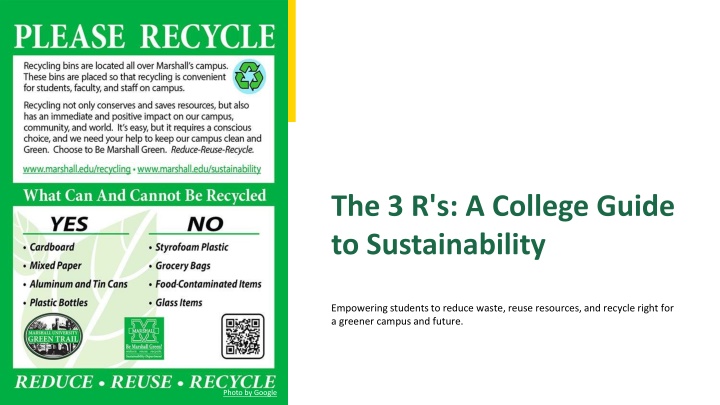
College Guide to Sustainability: Reduce, Reuse, Recycle for a Greener Campus
Empower college students to embrace the 3 R's - reduce waste, reuse resources, and recycle right - for a sustainable future. Learn practical strategies for minimizing waste, making smart choices in consumption, and maximizing recycling impact. Discover how to handle special waste like electronics and food responsibly. Let's build a sustainable campus and future together!
Download Presentation

Please find below an Image/Link to download the presentation.
The content on the website is provided AS IS for your information and personal use only. It may not be sold, licensed, or shared on other websites without obtaining consent from the author. If you encounter any issues during the download, it is possible that the publisher has removed the file from their server.
You are allowed to download the files provided on this website for personal or commercial use, subject to the condition that they are used lawfully. All files are the property of their respective owners.
The content on the website is provided AS IS for your information and personal use only. It may not be sold, licensed, or shared on other websites without obtaining consent from the author.
E N D
Presentation Transcript
The 3 R's: A College Guide to Sustainability Empowering students to reduce waste, reuse resources, and recycle right for a greener campus and future. Photo by Google
01 Rethink Waste: Embrace the 3 R's Table of Contents 02 Reducing & Reusing: Smart Choices 03 Recycling Right: Maximize Impact 04 Special Waste: Electronics & Food 05 Thank You!
1 Rethink Waste: Embrace the 3 R's Transforming our consumption habits for a sustainable future. Minimize waste by buying less and choosing products with minimal packaging. Prioritize durability and repairability. Give items a new life! Repurpose containers, donate unwanted goods, and embrace reusable alternatives like water bottles and bags. Understand your local recycling guidelines. Sort materials correctly to ensure proper processing and minimize contamination. Focusing on reduce, reuse, and recycle will help EPA work toward a circular economy for all. Photo by Google
2 Reducing & Reusing: Smart Choices Practical steps to minimize waste generation in daily life. Understand the environmental and economic advantages of reducing consumption and reusing items. Adopt strategies to prevent waste before it's created. Plan meals to avoid food waste and choose products designed for longevity. Opt for well-made, long-lasting products that can be repaired instead of replaced, reducing the need for frequentpurchases. Explore innovative ways to repurpose items, transforming 'trash' into valuable resources through DIY projects and upcycling. Photo by Google
3 Recycling Right: Maximize Impact Mastering the art of recycling for a cleaner environment. Learn the fundamental principles of recycling and its role in conserving resources and reducinglandfill waste. Identify common recyclables and understand the specific guidelines for preparingand sorting each type of material. Address common misconceptions and questions about recycling practices to improve participation and effectiveness. Recycle common recyclables to make a cleaner enviroment. Make an habit of recycling. Photo by Google
4 Special Waste: Electronics & Food Handling e-waste and food scraps responsibly. Properly dispose of used electronics to prevent environmental contamination and recover valuable materials through donation and recycling. Manage used household batteries, including lithium-ion, throughdesignated collection programs or recycling facilities. Implement strategies to prevent wasted food at home and explore composting options to reduce landfill impact. Start composting at home to reduce wastes. So, that wasted food can be reduced by you. Photo by Google
5 Thank You! Let's build a sustainable campus together. Thank you for your attention, let us promote a sustainable campus life by applying the principles of reduce, reuse, and recycle! Sign up for our e-newsletter to stay updated on the latest circular economy updates. Thank you! Do not hesitate to contact us if you have any question, we are available for feedback, or report a problem.Thank you! EPA recognizes the importance and impact of recycling, which has contributed to American prosperity and the protection of our environment. Photo by Google
